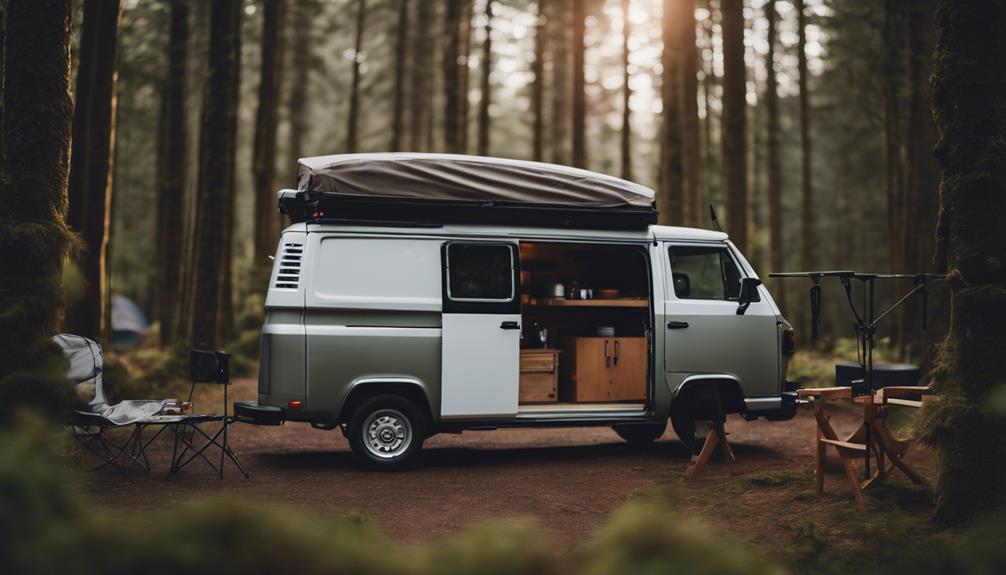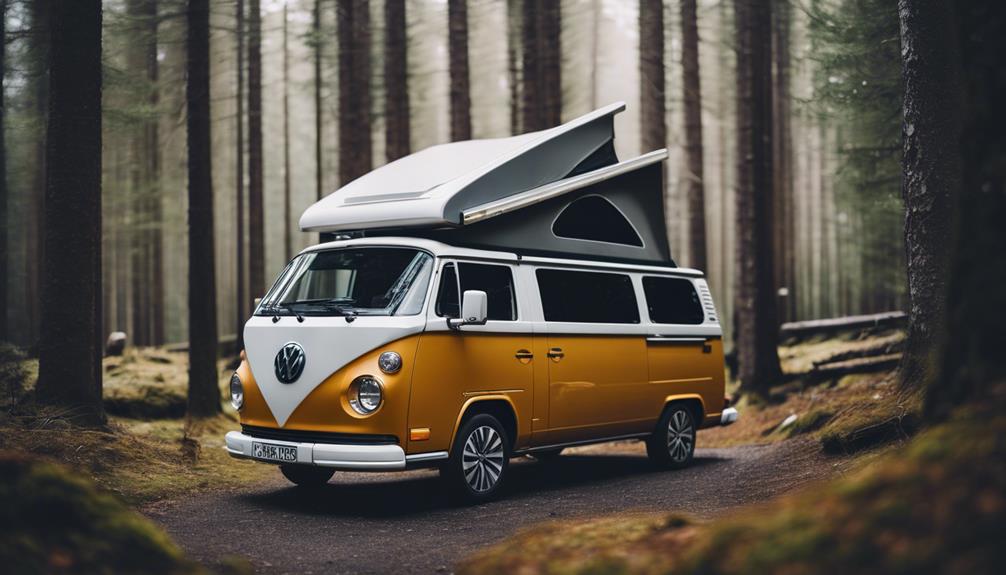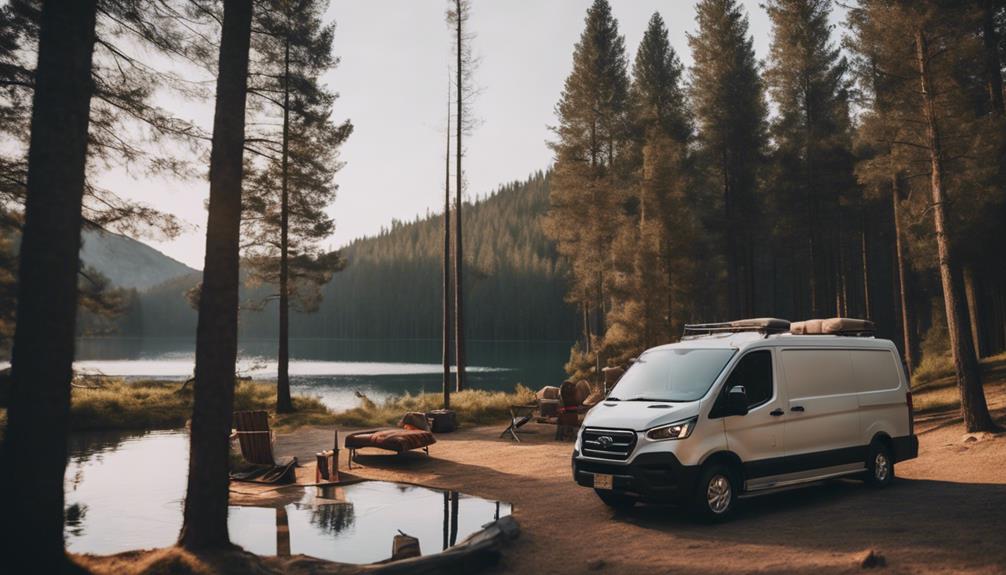If you're looking for the best medium wheelbase van for camper conversion, you can't go wrong with the Ford Transit, Renault Master, or Vauxhall Movano. Each offers a perfect balance of space, comfort, and functionality. The Ford Transit features versatile dimensions, while the Renault Master boasts excellent fuel efficiency. The Vauxhall Movano also stands out with its reliability. These vans not only provide ample room for custom layouts but also guarantee a comfortable living experience. Want to explore specific features and find the right fit for your conversion project? There's plenty more to uncover about each van's unique benefits!
Introduction
When it comes to camper conversions, choosing the right Medium Wheelbase (MWB) van can make all the difference in your adventure. MWB vans, typically ranging from 5.5 to 6.5 meters in length, strike the perfect balance between comfort and drivability.
If you're considering the best van for your needs, popular MWB van models like the Ford Transit and Renault Master are excellent options. These vans are renowned for their reliability and strong aftermarket support.
One of the key advantages of MWB vans is their impressive interior height, which ranges from 1.6 to 1.9 meters. This height allows you to stand comfortably while maximizing the efficiency of your living spaces.
You'll appreciate the versatility these vans offer, allowing for various layouts that can include pull-out beds and kitchen setups, all while providing ample storage options.
When planning your camper conversion, it's vital to keep in mind the average conversion cost, which typically ranges from $5,000 to $15,000. By selecting the right MWB van, you can create a custom space that perfectly suits your adventure needs.
Background Information
When you consider camper conversions, it's helpful to know the history behind van modifications and how they've evolved over time.
The rise of electric vans has also changed the landscape, offering new options for eco-conscious travelers.
Understanding these trends will help you make an informed choice for your camper conversion project.
Van Conversion History Overview
The van conversion movement has evolved considerably since its beginnings in the late 1960s, shaped by cultural shifts and a growing desire for alternative living.
During the late 1960s and 1970s, the concept of camper vans emerged, transforming medium wheelbase (MWB) vans into practical living spaces equipped for travel. This trend appealed to travelers and outdoor enthusiasts seeking recreational use and unique living experiences.
By the 1980s, MWB vans like the Ford Transit and Mercedes Sprinter gained popularity due to their perfect blend of space and maneuverability.
As environmental awareness heightened in the 2000s, the van conversion community embraced sustainable practices, opting for eco-friendly materials and energy-efficient appliances in their builds.
Fast forward to the 2020s, the van life trend surged, fueled by remote work opportunities, leading many to pursue custom builds for full-time living. This shift reflects a broader interest in alternative living styles, as more people recognize the freedom and adventure that van conversions offer.
Today, the rich van conversion history continues to inspire new generations to explore life on the road.
Emergence of Electric Vans
Amid growing environmental concerns, electric vans are gaining traction as a viable option for camper conversions, attracting eco-conscious travelers keen to reduce their carbon footprints.
Models like the Nissan eNV200 and Renault Master ZE are at the forefront of this change, offering sustainable alternatives to traditional fuel vans. However, their limited range poses challenges for longer trips. The Nissan eNV200 provides around 124 miles on a full charge, making it ideal for urban adventures, while the Renault Master ZE offers about 75 miles, requiring careful planning around charging infrastructure.
As you consider a medium wheelbase electric van for your camper conversion, it's crucial to weigh these factors. Sustainability trends drive interest in these vehicles, particularly among those wanting to utilize renewable energy sources in their van conversions.
Despite the advantages of electric vans, such as lower emissions and potential cost savings on fuel, the practicality of using them for extensive travel is still limited. As charging infrastructure expands and technology improves, electric vans could become a more feasible choice for your camper conversion needs.
For now, confirm that your travel plans align with the capabilities of these innovative vehicles.
Emerging Electric Van Technologies
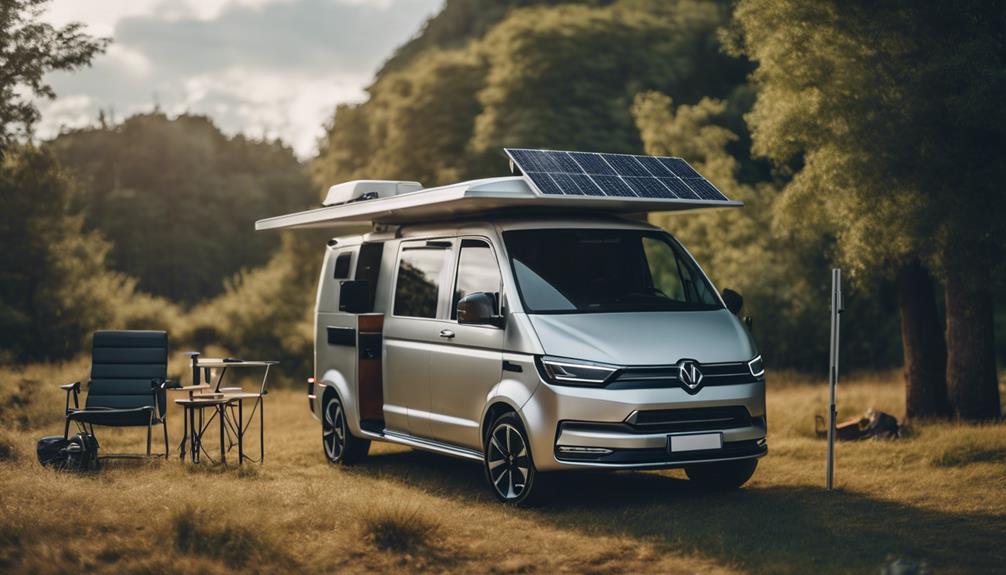
As you consider converting an electric van into a camper, innovations in electric van technologies and advanced battery efficiency are game changers.
These developments promise to enhance performance and range, making electric vans more viable for your adventures.
Electric Van Innovations
Emerging electric van technologies are reshaping the market, offering innovative designs and improved efficiency for eco-conscious campers. Electric vans like the Nissan eNV200 and Renault Master ZE are perfect for medium wheelbase van conversions, though they may have limitations in range. The Master ZE, for example, boasts a maximum range of about 75 miles per charge, making it ideal for short trips. However, this necessitates careful planning around existing charging infrastructure.
Battery technology is advancing, enhancing the sustainability of these vehicles and increasing their longevity. As a result, electric vans are attracting more eco-conscious consumers who prioritize environmental impact. Yet, it's crucial to evaluate the initial purchase cost, as these models typically come with a higher price tag compared to traditional vans.
Despite these challenges, the demand for electric vans is on the rise, fueled by manufacturers' investments and government incentives aimed at curbing carbon emissions. With continued improvements in charging infrastructure and battery efficiency, you can expect electric vans to become an even more viable option for camper conversions in the near future.
Advanced Battery Efficiency
Advanced battery efficiency is revolutionizing electric vans, enabling longer journeys and more sustainable camper conversions. With models like the Renault Master ZE, you can enjoy a 75-mile range, making these vehicles ideal for short trips and urban use. The incorporation of advanced battery management systems guarantees peak battery performance, enhancing lifespan and charging efficiency.
Technologies such as regenerative braking play an essential role in energy conservation. By converting kinetic energy back into stored energy during deceleration, you can greatly extend your driving range. Additionally, the use of lightweight materials and aerodynamic designs in medium wheelbase electric vans further boosts overall efficiency.
As the fast-charging infrastructure continues to grow, you'll find that many electric vans now support rapid charging capabilities, allowing you to restore up to 80% of your battery in under an hour. This convenience is crucial for those considering a camper conversion, as it guarantees you can quickly recharge during your adventures.
Embracing these advancements means you can enjoy a more efficient, eco-friendly travel experience while maximizing the potential of your electric van.
Performance Metrics Comparison
When considering the best MWB van for camper conversion, you'll want to weigh the advantages and disadvantages of each option.
Evaluating performance metrics like payload capacity, fuel efficiency, and handling can help you make an informed choice.
Let's explore industry expert insights and metrics that matter most for your camper conversion needs.
Advantages and Disadvantages
Evaluating the performance metrics of popular MWB vans reveals distinct advantages and disadvantages that can greatly influence your camper conversion choice.
The Ford Transit MWB stands out with a solid payload capacity of around 1,500 lbs and respectable fuel efficiency of 18-22 mpg, making it a practical option for many.
On the other hand, the Mercedes Sprinter MWB offers superior handling and safety features, but its higher initial purchase cost and maintenance expenses can be intimidating.
The Ram Promaster MWB features a front-wheel-drive system that lowers the floor height, enhancing loading ease, though older models have been criticized for transmission reliability issues.
Meanwhile, the Renault Master MWB excels in interior space, measuring 1.9m in width, perfect for spacious camper conversions. However, its build quality mightn't match that of its competitors, raising concerns about long-term durability.
When considering standing height, most MWB vans provide about 6'2", which is essential for comfort in your camper conversion.
Ultimately, weighing these advantages and disadvantages against your specific needs will help you select the best medium wheelbase van for your project.
Industry Expert Insights
Industry experts consistently highlight the Ford Transit MWB's impressive cargo capacity and versatile layout options, making it a top contender for camper conversions. With a load capacity of approximately 1,200 kg and a maximum load length of 3.0 meters, it's perfect for various camper setups.
Comparatively, the Mercedes Sprinter MWB stands out for its reliability and high gross vehicle weight rating (GVWR) of up to 3.5 tons, ensuring it can handle heavy loads during your travels.
On the other hand, the RAM Promaster MWB's unique front-wheel-drive system offers a lower floor height, simplifying the installation process for your camper conversion.
The VW Crafter MWB adds to the mix with a maximum load length of 3,450 mm and a payload capacity of around 1,300 kg, granting you ample space for customization.
Lastly, the Renault Master MWB provides a spacious interior with a load height of up to 1.76 meters, making it ideal for essential amenities.
Performance Metrics Evaluation
Performance metrics play a significant role in determining which MWB van best suits your camper conversion needs, highlighting factors like payload capacity, fuel efficiency, and interior dimensions.
When considering a Medium Wheelbase van, you'll find that options like the Ford Transit and Renault Master strike a balance between interior space and maneuverability, with lengths ranging from 3.0 to 3.5 meters.
The Ford Transit offers a robust payload capacity of about 1,500 kg, ensuring you can transport all essential materials for your camper conversions without sacrificing performance. Fuel efficiency is another critical metric; the Renault Master achieves around 25-28 mpg, making it a great choice for economical long-distance travel.
In terms of comfort, MWB vans typically provide an interior height of 1.7 to 2.2 meters, allowing for ample standing room and effective use of vertical space.
Additionally, maintenance costs for models like the VW Crafter are generally lower than those for larger vans, making them an economical choice for ongoing upkeep.
Essential Tools for Conversion
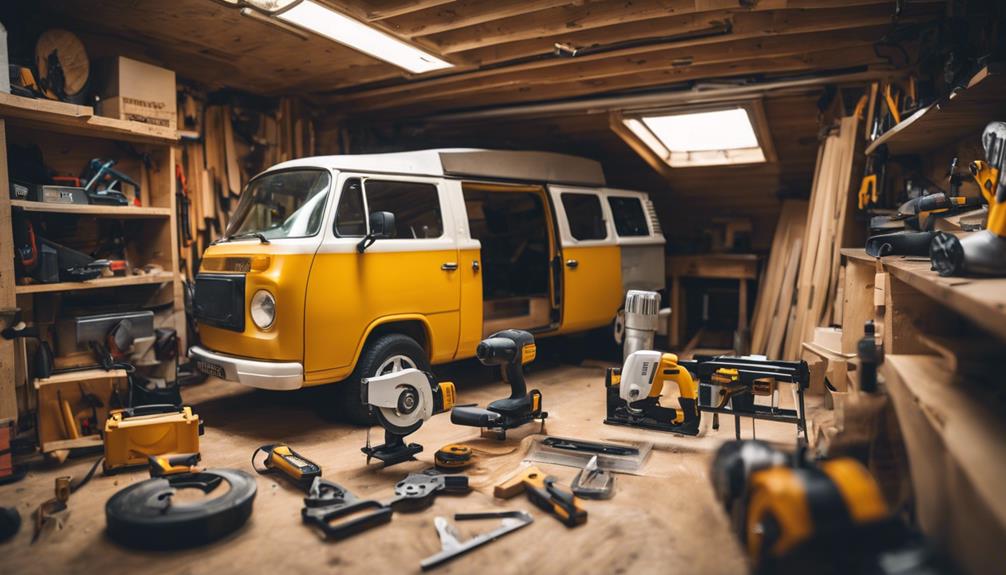
When you're gearing up for your camper van conversion, having the right tools can make all the difference in efficiency and ease.
You'll want a solid overview of the conversion process and techniques to keep things moving smoothly.
Let's break down the essential tools you'll need to tackle each step effectively.
Conversion Process Overview
To successfully tackle a camper van conversion, you'll need a range of essential tools that streamline the process and enhance your efficiency.
For medium wheelbase vans, having the right power tools is important. A power drill will help with assembly and installation, while a jigsaw is necessary for cutting wood and other materials to fit your design. For larger sheets of plywood or insulation materials, a circular saw allows for precise cuts.
Measuring tools, like a tape measure and level, are critical in ensuring accurate dimensions and even surfaces throughout the conversion process. A multi-tool can also be invaluable, providing versatility for tasks such as sanding, scraping, and cutting in tight spaces.
Don't forget about safety equipment! Gloves, goggles, and a dust mask are essential to protect yourself while working with power tools and materials that may produce dust or fumes.
Additionally, consider a heat gun for bending plastics or vinyl, aiding in the installation of insulation materials.
With the right essential tools, you'll maximize your efficiency and create a comfortable storage space in your camper van.
Conversion Efficiency Techniques
Having the right tools not only simplifies the camper van conversion process but also boosts your efficiency, allowing you to complete each task with precision and speed.
When tackling a medium wheelbase van, employing effective conversion efficiency techniques is essential. Start with essential tools like a circular saw for cutting panels and a jigsaw for more intricate shapes. An impact driver secures screws quickly, streamlining your workflow.
Don't underestimate the importance of a laser level when installing insulation and cabinetry; it guarantees everything aligns perfectly.
A multi-tool is invaluable for tasks like sanding and scraping, providing versatility during your camper conversion. Additionally, a digital measuring tool saves time and minimizes errors, vital for fitting components into the limited space of your van.
What Makes a MWB Van a Good Choice for Camper Conversion?
When looking for the best van camper conversion selections, a MWB van is a great choice. With its medium wheelbase, it offers the perfect balance of space and maneuverability. It provides enough room to create a comfortable living space while still being easy to drive and park.
Conclusion
In choosing the best MWB van for camper conversion, you'll find that options like the Ford Transit, Renault Master, and Vauxhall Movano strike an excellent balance between space, comfort, and maneuverability. These reliable options provide ample interior space, allowing you to create functional layouts for your camper conversions. The Ford Transit, for instance, offers versatility with dimensions that accommodate various configurations, ensuring you can include essential amenities without feeling cramped.
Driving ease is another essential factor, and MWB vans are designed to handle well on the road. The RAM Promaster, with its front-wheel-drive capabilities, enhances stability, making your travels more enjoyable. Additionally, consider fuel efficiency for cost-effectiveness, especially during extended trips.
When selecting your van, pay attention to standing height, as this will impact your comfort while living and moving within the space. Finally, don't overlook the potential for DIY customization, which allows you to tailor your camper to your specific needs and preferences.
Frequently Asked Questions
What Is the Best Van for Conversion to Campervan?
When you're deciding on the best van for conversion, consider factors like reliability, interior space, and budget. Popular choices include the Ford Transit, Mercedes-Benz Sprinter, and Ram Promaster, each offering unique advantages for camper setups.
What Is the Most Reliable Used Conversion Van?
When choosing a reliable used conversion van, consider the Ford Transit for its ease of repair, the Mercedes-Benz Sprinter for durability, or the Dodge Ram Promaster for its straightforward design. Check vehicle history for assurance.
What Is the Best Small Van to Convert Into a Camper?
When you're looking to convert a small van into a camper, consider options like the Ford Transit Custom or VW Transporter. Both offer versatility and space, making your camping adventures more enjoyable and comfortable.
Is MDF or Plywood Better for Van Conversion?
When considering MDF or plywood for your van conversion, you'll find plywood's light weight, moisture resistance, and durability make it a better choice for long-lasting, functional builds, despite MDF's lower cost and easier handling.
Conclusion
Ultimately, choosing the best medium wheelbase van for your camper conversion depends on your needs and preferences.
With the right tools and knowledge of emerging electric van technologies, you can create a comfortable and efficient living space on wheels.
Don't forget to take into account performance metrics to guarantee your van meets your expectations.
So, get out there, explore your options, and start planning your dream camper conversion today!

